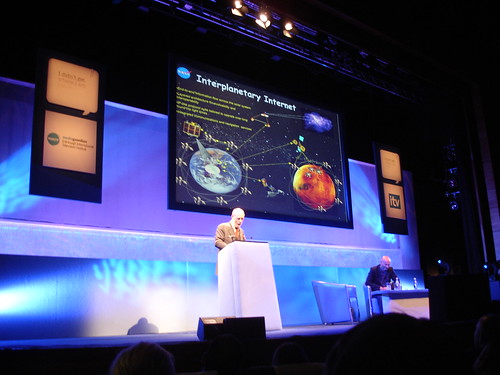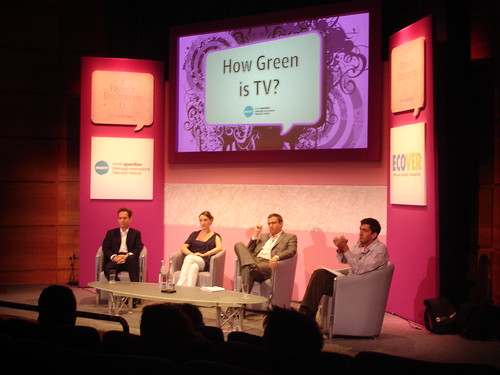September 30, 2007
Clubbin
I've heard my share of dud music but Ibiza took it to a whole new level. I've always been more of an audio than visuals kind of gal, and I love the notion of diversity, but somebody tell me please... why do these weird mainstream type people seem to care so little about goes in their ears on a night out?
Big
In the interest of research, a bunch of us ventured out to "the world's biggest nightclub". Blah. We stayed thirty minutes. Around midnight the place was vast, empty, and soulless. For most of the visit the DJ, suspended over a swimming pool in his "God is a DJ" style pulpit, rewarded us with the sound of someone playing the first level of Sony Playstation Portable's hit music rhythm game Lumines. Great game. Audio kinda poo on its own if you're not pushing buttons. I guess the myth that it's "all about the music" is thinner. If that's possible. I'm all up for being challenged by new music. When I tagged what I was hearing I did pause to wonder why I thought it was so cynical. Perhaps I'm just getting too old to appreciate new art. But no.. It was pants. It was filler. Whatever context you could think of. Fun? Interesting? Danceable? Atmospheric? The atmosphere was clearly "How far can we take the piss?" Wherever you go, the superclub experience is deeply cynical. Unless you bought into it. Cause no one wants to look stupid. Or feel they're groovin' to the lowest common denominator.
Little
Last night was much better. We lasted at least an hour back in London in a tiny bar club thing. Some unnamed below-stairs place in Fulham. Two dodgy house DJs battle it out for supremacy. At the same time. Two DJs. Two sets of speakers. One small room... The sound of a hostile takeover in play. It was how I imagine having worms in your head must feel. The most disturbing aspect was the reaction of the crowd or lack of. Nada... It was fairly early. Alcohol and party favours couldn't have totally been responsible. People were nodding along to the beat(s). I'd like to think they were rooting for their preferred audio layers, taking sides in the mix, willing one of mixes onto victory. But that's being more positive than I feel right now. My guess is that they were just trying to make the best of the pumpin' porridge. The human mind is a wonderful thing.
Now I'm the first to welcome diversity and experimentation but this wasn't either. They were just playing chicken with decks. Eventually one of the DJs was paid to stop playing and things stabilised. But not for quite a while. And while there were two DJs, no one left. The place was packed. No one looked particularly disturbed. Everyone was cool. Conversations continued. The things we can filter out are amazing. I must be overly sensitive.
Painfully bad
It's no coincidence that I'm thinking about the sound design of information warfare elements in Sanctuary at the moment. Clearly the task of developing sounds that club you over the head, that convey pain to a mainstream audience, and simulate futuristic information overload, is going to be a bit tricky. The flip side of being sophisticated consumers is that we sure know how to process gloop. Especially when we consider the gloop's context acceptable. Last night's context - a party... with tunes. What else do you want?!
Of course the same is true of any successful formula. Once we buy into things, that faith thing is hard to shift. I'm a bit of a fan when it comes to that mother of all media brands, the BBC, and not just because it paid my rent this year. But while working there, off and on the last nine years, I discovered that reputable media organisations like the Beeb are perhaps the one place in life where you can indeed polish a turd, proving the old adage wrong. You can slap the BBC brand on just about anything, no matter what the subject or quality level is, and pretty much guarantee extraordinarily large audiences, global visibility and some good press. Which goes some way to explain why people feel like they wuz robbed when rubbish, scandal and trust issues emerge. We really just want a good time without thinking too much about it. And we're prepared to put up with a lot for that.
So perhaps the mainstream clubber punter of the future would benefit from the sonic equivalent to Soylent Green - a uniform audio soup filtered through through the stereotypes of popular music and DJ culture. Perhaps a sound wave is around the corner that we can all be subjected to 24/7. Imagine Internet mailing lists and discussion groups merged into one noise channel - the raw emotional state of our society amplified and packaged in such a way that we absorb it without noticing.
Too extreme for Ibiza in the Noughties? Probably. It's probably more lucrative to keep the lads on the desk churning out pap and charging the punters 15 euros for water. But how low do you have to go before people vote with their ears and feet? And now I'm wondering what visuals I'm putting up with.
September 11, 2007
Cinea to no longer power BAFTA screeners
In an email sent out to all BAFTA Film Voting members yesterday it was announced that Cinea, the DRM division of Dolby, will no longer be supporting the film awards by providing free-of-charge DVD players and supporting them.
Feature film screeners, sent in the lead up to voting for awards like BAFTA and the Oscars, are an interesting kettle of fish for distributors. Recognised as a practical way of getting voters to eyeball your film, the cost of distributing these titles "safely" has come with mounting trust issues. Its impossible to pretend that a Hollywood blockbuster is anything other than a couple of gigabytes of data when it arrives in the post ahead of release. As a brand promotion I hope Cinea got some value from the scheme it ran for two years. How anyone could have classed this as secure is beyond me. In my re-mixable film studio the Cinea player was frequently used as the source for capturing video, though of course not with any copyright material, simply by connecting outputs to another recording device.
I viewed the arrival of the Cinea player in my home as a sign of the escalating arms race between content makers, consumers and pirates. As with the Cold War, its hard to see things slowing down although this announcement gives us some pause for thought.
Various titles last year used functionality of the S-View encryption to 'time out' the films after a few months - rendering them useless coasters. At least one title (Munich) failed to work completely and several others only played on the Cinea hardware with persistent efforts. How this impacted overall voting habits remains to be analysed. Start-up screens requesting PIN codes and requiring regular software upgrades to play new titles were, unfortunately, a taste of things to come.
Screener schemes have also come under scrutiny as a resource for pirates. Ironically, in a study published by Wired Magazine last year, looking at the P2P 'trajectory' of several high profile movies, the release of films into the wild appears to be happening much prior to the release of screeners. Film-makers trusting other film-makers may just be a necessary evil.
September 06, 2007
Edinburgh TV Festival
I caught a bit of the Edinburgh TV Festival a few weeks back. Three sessions stood out.
The keynote address was by Jeremy Paxman. I didn't hear his speech but its worth a read for an insider's view on the BBC and TV in general. His biggest gripe - that there doesn't appear to be a vision for TV going forward alongside other platforms.
Vint Cerf gave an interesting talk on the future of the Internet and touched on Interplanetary Network protocols being worked on with NASA. "The distances are astronomical!". Having Google's Chief Internet Evangelist on the bill was a good sign that new media is inescapable. If you came to the event without any knowledge of the Internet industry however, you could be forgiven for thinking that any Internet entrepreneur is rolling in dough. "Making squillions" was a phrase being bandied about, conveniently omitting the fact that the space is bigger than Google/Amazon/Yahoo/eBay/Joost etc. The suggestion that programme makers may still have to cough up for their 360 degree cross channel universe, rather than cadging favours from the big guns, is still obviously a bit hard to swallow.
"How Green Is TV?" was the compelling title of the final session I went to. It was less of a panel event than a slanging match between Martin Durkin and senior BBC Current Affairs staff in the audience over the issue of how to represent climate change in the media. I was struck by the fact that ecologically unsound processes within the media industry was barely touched upon, apart from an admission from the BBC that the corporation could be doing more. The whole debate was typical TV Industry - all about which egos and viewpoints should be getting more airtime.
Given the coverage the debate received in the press the next day (e.g. in The Guardian), I wasn't surprised by the announcement today that plans for a specially televised "Planet Relief" day of programming have been scrapped. Accusations that the BBC has an overtly liberal bias are not new. What is new is how climate change research is now most visible as a political tool to be used for other agendas than the environment. In the past, only the most committed ecologically-minded individuals paid the debate much heed.

